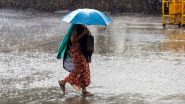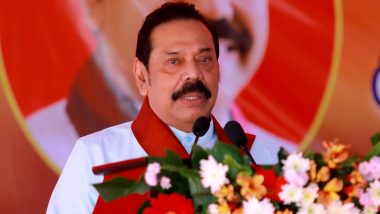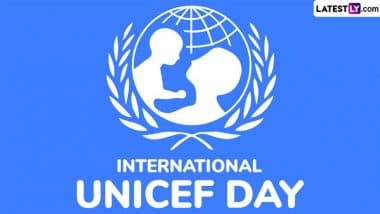Colombo, May 7: Sri Lankan Prime Minister Mahinda Rajapaksa is learnt to have responded positively to President Gotabaya Rajapaksa's request to him to quit in the face of the deepening economic crisis along with the imposition of the state of emergency in the island nation.
As per reports, at a special cabinet meeting at the Presiden's House, headed by Gotabaya Rajapaksa, Mahinda Rajapaksa agreed to resign from his post as Prime Minister of Sri Lanka, reported the Colombo Page. Sri Lanka Economic Crisis: Reports Claiming Mahinda Rajapaksa Has Resigned Are False, Prime Minister's Office Clarifies.
The Sri Lankan Cabinet had been informed that owing to the failure of the Prime Minister to cope with the country's ongoing economic crisis, Mahinda Rajapaksa has sought to resign from his position. His resignation will also mark the dissolution of the Cabinet as well. Further, Mahinda Rajapaksa had stated that if the only solution to the persistent economic crisis in Sri Lanka is his resignation, he is willing to do so.
Meanwhile, Sri Lankan President Gotabaya Rajapaksa had accepted that amidst strong protests by the people it has become a serious problem to manage the economic and political crisis in the country, reported the Colombo Page. He added that the crisis had resulted in an absence of tourists in the country. Moreover, the closure of factories had also piled up the burden on the already prevalent economic woes.
Further, political sources reveal that Sri Lankan Cabinet ministers, Prasanna Ranatunga, Nalaka Godahewa, and Ramesh Pathirana, have all agreed to Mahinda Rajapaksa's decision of resigning as the Prime Minister of the country. However, in contradiction with the Cabinet ministers, Minister Wimalaweera Dissanayake had stated that Mahinda's resignation will prove futile in dealing with the country's crisis.
In addition, political sources also show that Prime Minister Mahinda Rajapaksa is due to announce his resignation from his post in a special statement on Monday, followed by a cabinet reshuffle in the next week, reported the Colombo Page.
Meanwhile, Sri Lanka is struggling with acute food and electricity shortages, forcing the country to seek help from its neighbours. The recession is attributed to foreign exchange shortages caused by a clampdown on tourism during the COVID-19 pandemic. The country is unable to buy sufficient fuel and gas, while the people are being deprived of basic amenities as well.
The economic situation has led to huge protests with demands for the resignation of Prime Minister Mahinda Rajapaksa and President Gotabaya Rajapaksa.
(This is an unedited and auto-generated story from Syndicated News feed, LatestLY Staff may not have modified or edited the content body)













 Quickly
Quickly





















